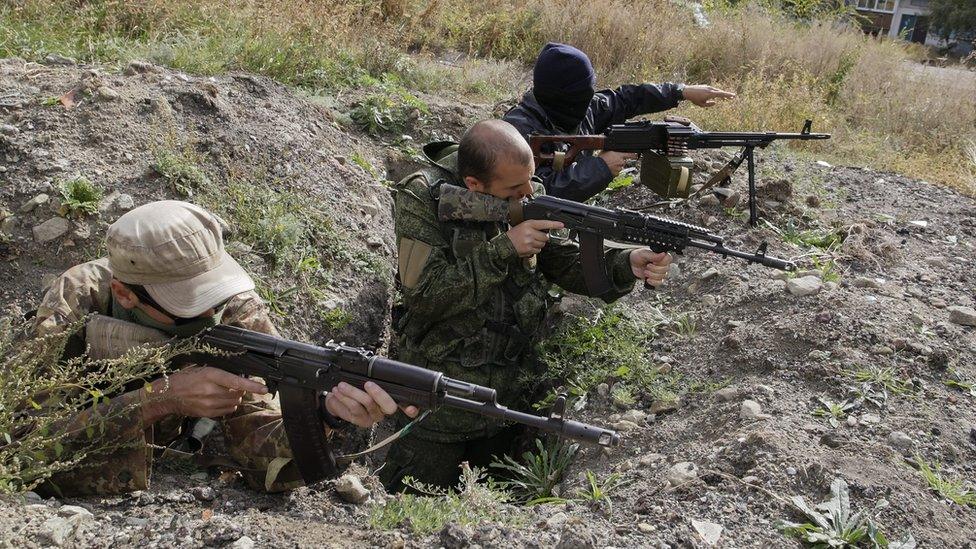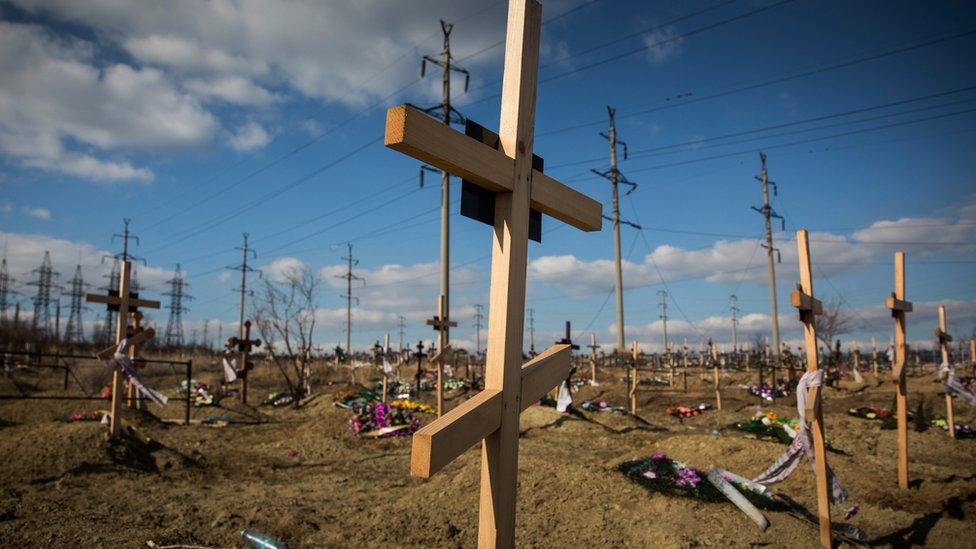Ukraine conflict: The Brits fighting with pro-Russian rebels
- Published
The British man says a lack of job prospects in the UK led him to travel to Ukraine
His Manchester accent is unmistakable. His yearning for British food is too, as he declares that he "could murder a steak".
Eastern Ukraine is not his first conflict. He claimed he was involved in Bosnia, and says he thought about joining the Kurdish Peshmerga in northern Iraq.
Britain has been supplying non-lethal equipment to Ukraine, and British troops have been training Ukrainian forces for several months.
Earlier this month the British Government announced that another 25 military personnel would be added to the programme to train the Ukrainian army.
So what has brought this man in his thirties, who claims to have served in the British army, to fight for the pro-Russian militia against Ukraine?
'Western aggression'
The first reason appears to be his lack of prospects back home. He has not had a job since last December.
He claims zero-hour contracts, which allow firms to hire staff without any guarantee of work, forced him "to vote with his feet".

But ideology also led him to travel more than 2,000 miles (3,200 km) to live off army rations, in a tent in a wood, by a stream, with a group of rebel soldiers, just north of the city of Debaltseve in rebel-held territory.
"I see this as more western imperial aggression towards Russia, to people who aren't playing the western game", he said.
He did not want us to show his face or use his name.
He says that after watching reports in the media about far right groups in Ukraine, he was inspired to join the rebels.
'I'm not a terrorist'
In reality, far-right groups in Ukraine enjoy minimal public backing.
In elections in 2014 political parties on the far right got less than 5% of the vote.
It is true that two volunteer groups in the Ukrainian military, the Right Sector and the Azov Battalion, have far right ultra-nationalists in their ranks.
However, their prominence in Ukraine has been overplayed in the pro-Kremlin media, to create a myth that the rebels are on some kind of crusade against Kiev-inspired fascism.
The fact that two British men have come to fight with the rebels, believing they too are fighting fascism, shows that Russia's version of events is having an international impact.

Both men see the conflict as driven by Western aggression
A second man, from Scotland, who didn't want to be interviewed, admitted that he had been inspired to join the conflict in Ukraine by reports he had seen in the "non-mainstream" media.
The man from Manchester denied he was "meddling" in the conflict, and said he didn't see how he could be breaking British law.
"I'm not a terrorist", he said. "Not like these jihadists that go out to Syria."
However, Ukraine says the men fighting for the pro-Russian militia are Russian-backed "terrorists".
And the British government said "people who travel abroad to participate in conflicts may be committing criminal or terrorism offences and could face prosecution when they return to the UK".
Wearing a balaclava over his face during our interview, the British man said he would be prepared to kill someone if his life was threatened.
And he said that if he died in eastern Ukraine, it would have been worth it because he is "doing something he is proud of".

A ceasefire in eastern Ukraine has largely been holding after months of conflict
He believes he is protecting people living in rebel territory from the rest of Ukraine.
And despite believing that the conflict in Ukraine was caused by "imperial aggression towards Russia", he does not think that Russia has been involved in any way.
But does his family know he's here?
His dad does: "He kind of agrees. He's another socialist," he said.
But he admits that in the three months he has spent in eastern Ukraine, he "has not fired shot in anger".
After 18 months of fighting, there is finally a real ceasefire.
And there are reports than some foreign fighters in Ukraine are now thinking of leaving and travelling to Russia's latest foreign policy venture: Syria.